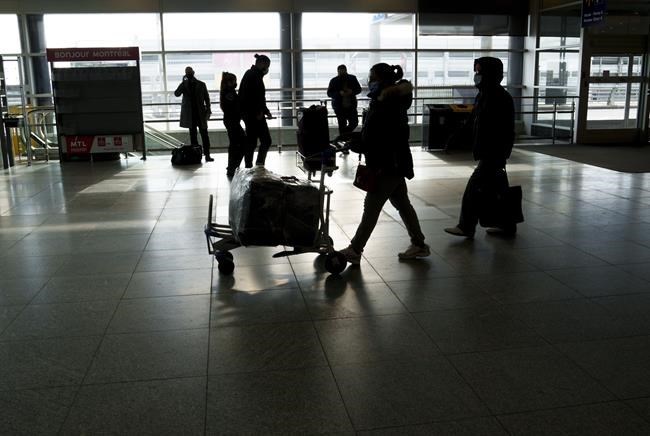OTTAWA — An Ontario infectious disease specialist says there is evidence testing all travellers before and after they arrive in Canada will identify most cases of COVID-19 coming into the country.
McMaster University physician Dr. Zain Chagla is highly critical of Canada's plan to try and slow the spread of the new Omicron variant by banning travellers from 10 African nations only, and said testing, not travel bans, is a less harmful and more effective mitigation strategy.
"Look, I don't think we're going to be able to shut our border to this variant," Chagla said.
He points to the fact in the early days of the pandemic most focus was on paying extra attention to travellers from China, but for Canada, the majority of early cases came in from Iran, the United States, Europe and Egypt.
And he says a study done in Canada in September and October 2020 found 1.5 per cent of international travellers were testing positive for COVID-19, and two-thirds of those were identified by testing them at the airport when they arrived. Another 27 per cent were picked up by testing a week later. Only six per cent tested positive two weeks later.
He said if you test people a few days before they leave, that helps lower the risk people on planes have COVID-19, and if you test when they land and pick up two in every three travel cases, that will go a long way toward mitigating the spread of new cases coming into Canada.
Canada is starting to test many international air travellers upon arrival, but Health Minister Jean-Yves Duclos said Friday — days after the new measures were first announced — it's still not happening everywhere.
"It will take a few days before we are able to test all targeted travellers but we are ramping up our capacity quickly and testing more and more travellers every day," Duclos said at a news conference.
He said since Wednesday testing had expanded by 60 per cent, but not every airport is testing all international travellers yet due to problems finding space in airports to do the tests and lab capacity to process them, as well as human resource limitations.
Travellers who were in the United States are still exempt from the policy, though people arriving from somewhere else via the U.S. will still be affected.
Duclos also defended Canada's decision to ban travel from 10 African countries as a way to slow the spread of the variant while other measures take hold.
"We knew from the start that it would eventually occur in almost all our countries," he said.
The World Health Organization said Friday 38 countries have now reported at least one case.
He said that's why the universal measure to test international air travellers is being implemented. But in the meantime he said it was important to try and stop most incoming travel from countries which, even if they hadn't identified Omicron, were showing signs of high rates of overall transmission, and where there is limited local testing capacity.
Chief public health officer Dr. Theresa Tam said Canada was finding that travellers coming from Nigeria and Egypt, for example, were more likely to test positive for COVID-19 than those coming from elsewhere.
She said the testing being done is going to help Canada spot any trends if there are countries that are a bigger risk than others, and that will help inform Canada's plans going forward.
"We do have to re-examine these measures almost every day," she said. "I think we need to be flexible and if the situation changes, we don't think this list is applicable for example, we need to prepare to scale it down or up."
The world learned about Omicron just a week ago, after South Africa publicized data identifying the presence of a new variant spreading there.
The variant has multiple mutations from other known versions of the virus that causes COVID-19 raising concerns that it might find ways around existing vaccines. It is believed to be transmitted more easily but whether it causes more severe illness is still not known.
But Chagla said playing "whack-a-mole" with travel bans affecting only some countries is based on political expediency, not science.
"It was reactive," Chagla said Friday in an interview with The Canadian Press. "I think as countries started pulling the trigger other countries started pulling the trigger and showing their population that they were doing something about it."
This report by The Canadian Press was first published Dec. 3, 2021.
Mia Rabson, The Canadian Press

